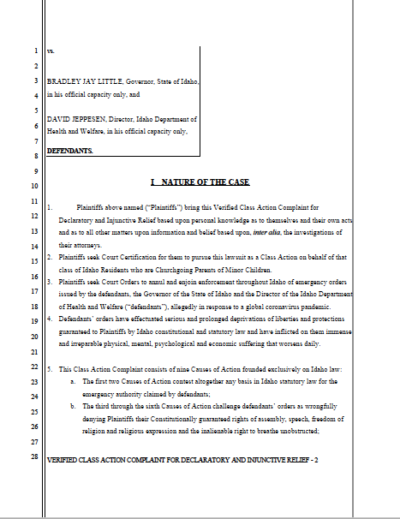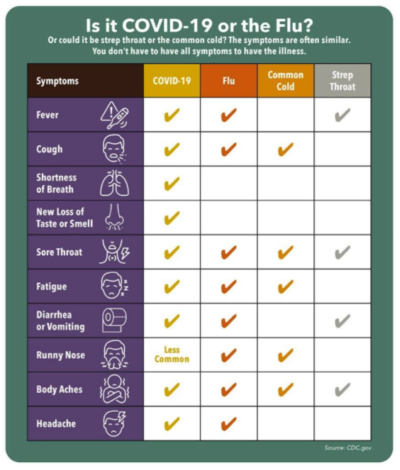Flu vaccine drive, class action lawsuit attack pandemic from different angles
By Eric Valentine

“It was the best of times, it was the worst of times …” wrote Charles Dickens in his novel A Tale of Two Cities, set in London and Paris, about two characters who appear the same but live very different lives. When it comes to managing COVID in the Valley—and elsewhere—it may feel like the author was foreshadowing life in 2020.
In the same 24-hour period, seven healthcare organizations teamed up to make a joint announcement on their collective flu vaccination program while a prominent Ketchum lawyer publicly released a draft document spelling out a class action lawsuit against the governor and attorney general of Idaho demanding all current emergency powers allotted to the governor be rescinded.
Physicians want people to stay healthy and help reduce impacts on hospitals that could be overwhelmed by a combination of a bad flu season and COVID-19. So, St. Luke’s, Saint Alphonsus, Primary Health and four other healthcare providers have launched a widespread outreach effort encouraging people to get their flu shots and telling them exactly where and how to go about it.
“We know there may be people who are concerned about coming into a doctor’s office to get the flu shot or may think they don’t need it because they’re wearing a mask and physically distancing themselves. While those precautions are good, we know the flu still finds ways to get us sick,” said Dr. Laura McGeorge, St. Luke’s Health System Medical Director, Primary and Specialty Care.
On the other side of the pond is Ketchum attorney James Hungelmann and an already outspoken critic of the all-things COVID management who says Governor Brad Little’s use of emergency powers is blatantly unconstitutional. Hungelmann has drafted a fill-in-the-blank-style, 46-page class action lawsuit he’s hoping gets used by folks to bring the matter to court.
“The document is a draft, not an actual filing,” explained Hungelmann. “It’s academic, but very real.”
Virus2

As for the healthcare providers’ effort, health leaders are concerned about the possibility of high flu-related hospitalization numbers on top of the COVID-19 patients they are already anticipating. While uncommon, patients can be infected with both viruses. In these cases, physicians expect disease to be more severe. Hundreds of thousands of people are hospitalized in the United States each year for flu. During the last influenza season, CDC estimates 490,000 people were in the hospital with flu, with 810,000 hospitalized the year before.
“With a pandemic, the flu vaccine becomes even more critical,” said Dr. Richard Augustus, chief medical officer for West Valley Medical Center. “By preventing influenza in the first place, or reducing the severity of the illness with vaccines, it could ultimately help to reduce the strain on our healthcare resources and ensure we have a place in the hospital for people who need it most.”
What follows is a rundown of what each healthcare organization is doing to help deliver flu shots during the pandemic.
Primary Health Medical Group—Offers walk-in flu shots at 16 locations, open daily. High dose is available for patients 65 and older, and nasal mist is available for kids ages 2–18. Find a location near you at PrimaryHealth.com/FluShot.
Saint Alphonsus Health System—Offers multiple options for flu vaccinations this year, including: drive-up flu clinics available by appointment at select locations, starting Sept. 29 through Oct. 30. Visit saintalphonsus.org to schedule an appointment online.
Saltzer Health—Offers walk-in flu vaccinations at all four urgent care clinics in Meridian, Nampa and Caldwell.
St. Luke’s Health System—To maintain physical distancing and discourage congregations of people, St. Luke’s encourages patients to schedule an appointment for their flu shot at their primary care clinic via myChart. You can also make an appointment by calling your St. Luke’s primary care provider.
One Angry Man
As for the class action lawsuit, Hungelmann addressed the introductory letter to his document to Idaho Lieutenant Governor Janice McGeachin. But he remained tight-lipped during a phone interview about who or which group may take the first step to turn his lawsuit blueprint into a formal class action against the governor and David Jeppesen, the director of the Idaho Department of Health & Welfare. Hungelmann was very clear there was significant support behind his efforts.
“You don’t spend the amount of time I’ve spent (creating this document) without many many people behind it,” Hungelmann said.
Already in July, Hungelmann approached the City of Ketchum with complaints about businesses requiring people to wear masks inside their establishments. According to city documents, Hungelmann wrote Mayor Neil Bradshaw and the city council members requesting them to intervene.
In his letter, Hungelmann states, “I kindly ask, and must insist, that the Ketchum and Hailey councils together with Blaine County Commissioners immediately give notice to all local businesses providing the public with essential goods and services, and grocery stores in particular, as to the nature of the Medical Vulnerability exemption, with clear emphasis that they must not deny essential goods and services to those suffering medically.”
Hungelmann also writes in that letter, “The Masking Agenda is nothing short of perverted and predatory Epstein-style subjugation and humiliation, akin to brutally Nazi live human experimentation, torture and extermination tactics gleefully employed by deranged deviants whose true nature not so deep down appears as Aching Aides and Angels of Auschwitz.”


